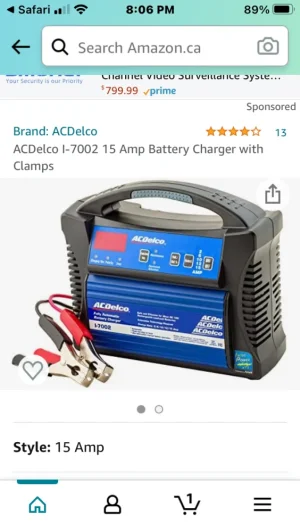Soliciting thoughts from you auto experts. I'm pretty sure my sons truck has a slow short somewhere, we have gone through a battery per year the past 3 years. It doesn't help matters that its been very cold he doesn't start it every 2 weeks, but I wont air my family laundry. I used to boost but getting less keen about that. AMA is booked until July-2024 (kidding but seems that way). Anyways I'm thinking a charger might be worthwhile.
There are many new fangled digital products out there but reading the reviews, not all of them are great. Some don't like charging in cold, which is typically when you need them. Some claim certain amp capability but people say inflated numbers. And I read some chargers just say no & blink error if battery level is too low. But then they plug in a different brand & away it charges which makes me wonder if its a safety thing or charger limitation.
- any recs of what to get or what to avoid?
- is it possible to buy too much amp delivery? More amps = less charging time but for example 75A charger output but safe/recommended 12V rate shouldn't exceed 50A? (just making up numbers I have no idea)
- why is 24v a thing, do them mean like RV battery use or the charging voltage can go up from nominal 12?
I was looking for old school manual switch & needle meter style like this for example
https://www.homedepot.ca/product/lincoln-electric-55a-century-charger-10-2-55a-/1000721724
What about these styles? Am I interpreting correct its a 30A charger but you click to 100A boost & try to start off that like cables to another car battery?
https://www.amazon.ca/Schumacher-SC...ds=12v+battery+charger&qid=1613269767&sr=8-16
There are many new fangled digital products out there but reading the reviews, not all of them are great. Some don't like charging in cold, which is typically when you need them. Some claim certain amp capability but people say inflated numbers. And I read some chargers just say no & blink error if battery level is too low. But then they plug in a different brand & away it charges which makes me wonder if its a safety thing or charger limitation.
- any recs of what to get or what to avoid?
- is it possible to buy too much amp delivery? More amps = less charging time but for example 75A charger output but safe/recommended 12V rate shouldn't exceed 50A? (just making up numbers I have no idea)
- why is 24v a thing, do them mean like RV battery use or the charging voltage can go up from nominal 12?
I was looking for old school manual switch & needle meter style like this for example
https://www.homedepot.ca/product/lincoln-electric-55a-century-charger-10-2-55a-/1000721724
What about these styles? Am I interpreting correct its a 30A charger but you click to 100A boost & try to start off that like cables to another car battery?
https://www.amazon.ca/Schumacher-SC...ds=12v+battery+charger&qid=1613269767&sr=8-16

